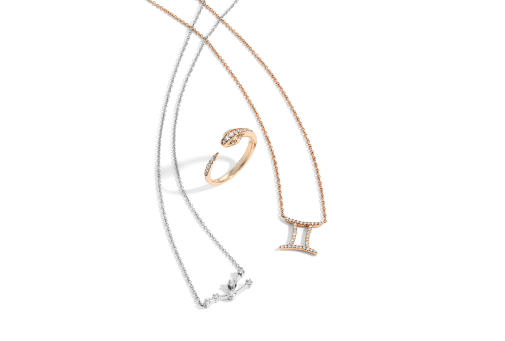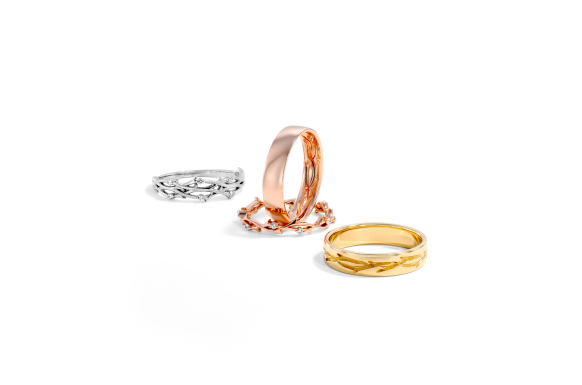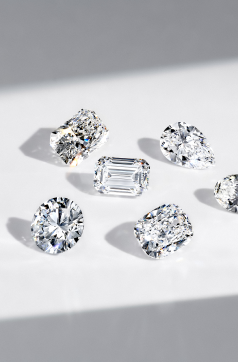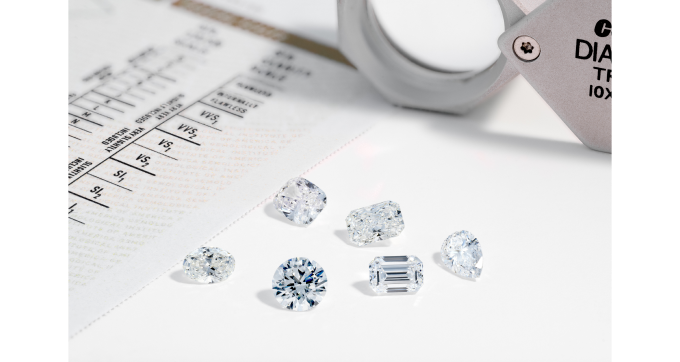In a perfect world, every bright white sparkling stone would be a diamond! But unfortunately fake stones can be passed-off as diamonds to unsuspecting buyers.
Using a diamond tester can protect you from the financial loss and disappointment of being sold a fake diamond. These electronic devices identify real diamonds with remarkable accuracy.
In this guide, well share the lowdown on what diamond testers are and how much a decent diamond tester costs.
What is a diamond tester?
A diamond tester is a portable electronic device that can tell real diamonds from fakes. They are also called diamond test pens, diamond selectors. You can use them for quick, precise, and safe diamond testing. Most diamond testers have a hand-held rectangular body with a probe that touches the diamond to test it. The tester's body has an LED panel that indicates a real diamond with flashing lights or beeping.
How do diamond testers work?
Diamond testers use the thermal properties of diamonds to establish their authenticity. The testing process takes only a few seconds to produce a definitive reading. Every diamond tester has an electronic thermal probe. The probe has two copper tips that send heat through the gem that they test. One tip of the tester's probe transmits heat and the other tip measures the temperature at the probe.
These battery-powered devices rely on the characteristic high thermal conductivity of diamond. This physical property separates diamond from its imitators and other types of gem. A real diamond rapidly conducts the heat from the diamond testers probe. This produces a marked drop in the surface temperature of the stone that the probe detects for a positive reading.
Are diamond testers accurate? Do diamond testers work?
They may seem too simple to be true, but diamond testers are one of the most accurate methods for identifying real diamonds. The thermal effect the tester measures clearly differentiates diamonds from most other gems. Diamond merchants, gemologists, and jewelers use these tools when buying or selling diamonds.
Can fake diamonds pass a diamond tester?
Basic thermal diamond testers can be fooled. Moissanite, a popular diamond alternative has physical characteristics that are extremely close to diamond. Depending on its composition it can conduct heat at a similar rate to diamond, tricking the tester.
Other stones that can fool a diamond tester include:
- natural or synthetic gems that have been cooled in ice
- black or colored stones
- large, cold rough diamonds
- white sapphire
- synthetic ruby
- phenakite
High-spec diamond testers use electricity and heat
Some diamond testers have electrical probes as well as thermal probes. To prevent fake stones from evading the tester, these smart diamond testers send an electrical current into the diamond as well as heat.
Why? Because diamond does not conduct electricity! This second test uses the property of electrical conductivity to identify Moissanite and many other stones. If its transmitting current, its not a diamond.
How much is a diamond tester?
You can purchase these handy devices at a range of price points. The cheapest diamond testers usually offer a basic thermal probe, but more sophisticated testers can provide you with greater accuracy and additional features. Heres what you will get for your money:
Diamond testers under $50
These are the cheapest diamond testers which are usually limited to thermal testing. If youve hunting for diamonds at garage sales, thrift stores or on eBay, and want to check your find, these are the diamond selectors for you!
Prices
Prices start from as little as $15 for these basic battery-operated diamond testers.
Features of an under $50 diamond tester
Low-priced diamond testers carry an off/on switch, volume controlled buzzer, LCD display and LED indicator to let you know if you have diamond.
Pros of an under $50 diamond tester
Price is the number one advantage of these diamond selectors. For a few dollars you can try out the tester to see is owning one will be worthwhile for you.
Cons of an under $50 diamond tester
These diamond testers are cheap but more easily fooled and will struggle to distinguish Moissanite from real diamond.
Battery life is short, so the working time you have with the tester before changing batteries is limited. The design of cheap diamond testers tends to be chunky and dated. Quality and replaceable parts may be an issue too.
Diamond selectors for $100+
At this price point diamond testers become more reliable, offering both thermal and electrical testing. They are a great buy for the determined novice or buying a diamond overseas. These diamond selectors will reassure that you have got the real thing!
Prices
For $100 or more, expect a competent diamond tester with sleek ergonomic design and decent battery life.
Features
Aside from the basic features described above, mid-range diamond testers have:
- Fast warm up times
- A clear “Yes/No” reading for diamond
- A beeping metal alert that does of if you touch metal rather than the stone
- Settings for testing larger or smaller diamonds
- Working times of two hours or more
- Practical accessories like loose stone holders, and digital scales weighing in carats
- Automatic shut-off
Pros of diamond selectors for $100+
For $100+, you can buy a diamond tester that is easy enough for a beginner to use but capable of professional performance.
Cons of diamond selectors for $100+
The diverse testing accessories supplied with mid-range diamond testers may be confusing for a beginner.
Diamond testers for $200+
These are the most expensive diamond tester and include professional quality tools that have a wide range of functions. The most expensive models can test for other gems and identify synthetic diamonds.
Prices
These high-specification diamond testers can cost anywhere from $200 to $2000 or more.
Features
- Ultra-thin probes that can even test melee diamonds
- Competent testing of loose, mounted and close backed stones
- Retractable and replacable probes
- Measurement of UV light absorbance to distinguish diamond from Moissanite
- Detailed profiling of gems including CVD, HPHT, and Type lla stones
- Intuitve digital displays with written results
Pros of diamond selectors for $200+
High-end diamond testers use the most advanced technology available. These professional diamond testers work reliably on polished and unpolished stones. World-class brands like Presidium in Singapore produce highly calibrated diamond testers. You can use these devices to test large numbers of stones in a single session.
Cons of diamond selectors for $200+
These diamond testers have superb build quality and performance. They are very expensive if you aren't using them professionally.
Frequently asked questions for diamond testers
Is UV light a necessary feature?
Some diamond testers carry a UV light. You can use this light to perform a test that can help you verify if a diamond is real. In a dark room, simply place the diamond under UV light and observe its reaction.
UV is useful because it excites the electrons in the diamond, causing it to emit a blue-colored glow. This reaction is present in a third of real diamonds. Fake diamonds glow a different color or do not glow at all.
Can a diamond tester distinguish a lab-created diamond from a natural diamond?
Natural and lab-created diamonds are both authentic diamonds. This means that most diamond testers will identify a lab-created diamond as a diamond. Advanced diamond testers can identify lab diamonds. Sensitive testing equipment can identify subtle differences in the responses of lab diamonds. They do this by targeting the common impurities or trace elements in lab-created diamonds.
What is a multitester?
Multitesters are diamond testers that can identify several types of gem. They have microcontrollers that process thermal and electrical readings to authenticate common gems. A multitester can identify:
- Diamond
- Moissanite
- Other common diamond simulants
- Ruby
- Sapphire
These all-in-one instruments display their results clearly on a digital display.
Quick tips for establishing the authenticity of diamonds
Using a diamond tester is only one of many ways of checking if a diamond is real. Experts will use many techniques, tests, and tools on the gems they buy and sell to make sure they're the real deal. Alongside your diamond tester try these three quick and easy tests for loose stones:
1. The water test
This test is as simple as they come! Just drop the stone into a clean glass of water. A real diamond will sink, but fakes will bob about or frankly float! This is because diamond is extremely dense. This is not an absolute guarantee of a diamond, but increases your confidence that your diamond is real.
2. The dot test
The dot test demonstrates the strong refractive properties of diamond. Take a piece of plain paper and draw a dot at its center. Place the stone table down on the dot. Look down though the pointed end of the diamond at the dot. If you have a real diamond, you wont be able to see any sign of the dot. This is because high refractivity of diamond bounces the light in multiple directions, obscuring the dot.
3. The heat test
This test is not for the faintheated as you may have to brace yourself for an exploding stone. The heat test involves holding the stone in tongs and heating it over a lighter. Heat the stone for 30 to 40 seconds plunge the hot stone into cold water. A simulated diamond will explode, but a real diamond will live to tell the tale! Make sue you do too by wearing eye protection, gloves and keeping a safe distance when you dop the stone in water.
Real diamonds need professional authentication
Buying fully-appraised stones provides you with protection. The characteristics of the stone you buy are professionally verified and described in detail. This certification includes the cut, color, clarity, and carat weight of the stone. You'll need this document to insure your gem. Then an insurer can replace it with a gem of like value if it is damaged, lost or stolen.
Conclusion
Diamond testers identify diamond, but only professional certification can put your mind at ease. Reputable jewelers provide valuable stones like diamond and Moissanite with a professional appraisal.
Why not browse our range of genuine loose diamonds and loose Moissanite stones? We can provide expert online help with purchasing appraised stones






